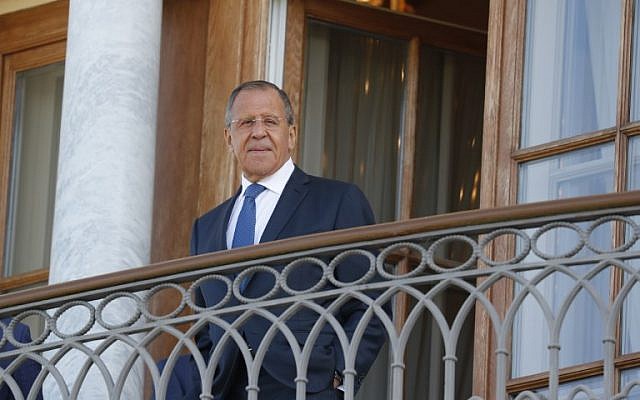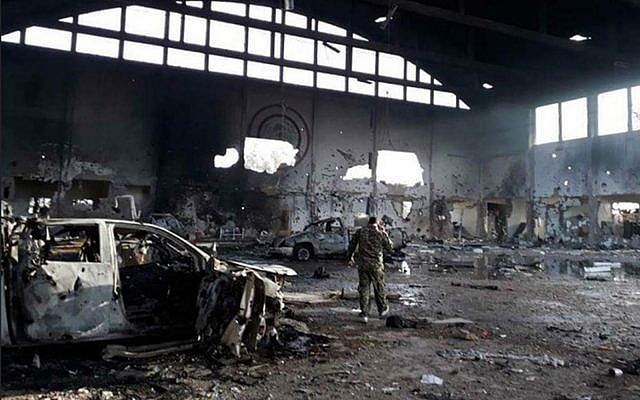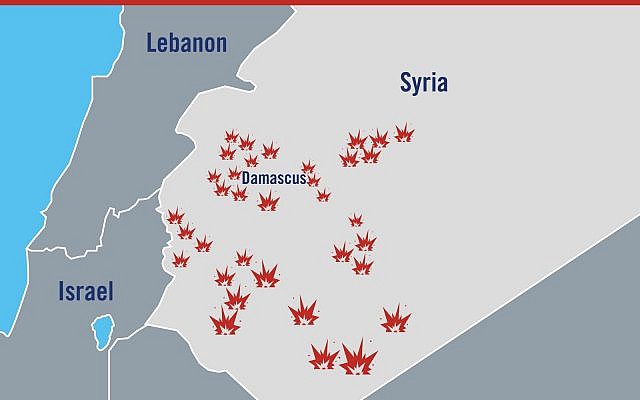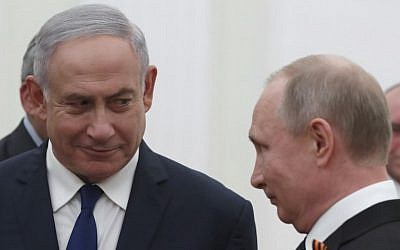Foreign Minister Lavrov indicates Moscow open to Israeli demands that Iranian forces be kept far from Israel’s frontiers; urges withdrawal of all ‘non-Syrian forces’
By TOI STAFF

Russian Foreign Minister Sergey Lavrov said Monday that only the Syrian regime should field military forces in the country’s southern border areas.
Lavrov’s comments, made at a press conference in Moscow, apparently referred to areas including the Syrian Golan Heights region abutting the Israeli Golan Heights and the border with Jordan, and indicated that Russia was open to Israeli demands that Iranian forces should be kept far from Israel’s borders.
The area is currently held by various rebel groups and Israel has accused Iran of trying to establish a presence in the area. Israel also accused Iran of firing a salvo of rockets at Israel from the area earlier in the month.
“Of course, the withdrawal of all non-Syrian forces must be carried out on a mutual basis, this should be a two-way street,” Lavrov said at a news conference in Moscow.
“The result of this work which should continue and is continuing should be a situation when representatives of the Syrian Arab Republic’s army stand at Syria’s border with Israel,” Lavrov said.
Earlier Monday, the Haaretz daily reported that Russia is considering trying to keep Iranian forces and their allies from Israel’s northern border, fearing that repeated Israeli strikes may undermine Syrian President Bashar Assad’s grip on the country.
Citing Israeli security and diplomatic sources in Jerusalem, the Haaretz report said Russia decided to work on a deal to remove the Iranian troops following a heavy Israeli attack on Iranian targets in Syria on May 10. The bombing raids came after Iran’s Islamic Revolutionary Guard Corps’s al-Quds Force launched 32 rockets at Israel’s forward defensive line on the Golan Heights border.
Israel has acknowledged carrying out several aerial raids on Iranian targets in Syria, and is suspected of carrying out several more, the most recent last week, when a military air base in western Syria was hit in an airstrike.
Much of the Iranian infrastructure is set up on Syrian bases and Israel has also frequently hit Syrian air defenses during strikes on Iranian targets.
The preemptive effort by the Israel Defense Forces against Iran and its allies in Syria is known collectively as “Operation Chess.”
However, just last week, Iran appeared to reject remarks from Russia’s leader that the Islamic Republic should pull its forces out of Syria after a political settlement is reached in the war-torn country.
“No one can force Iran to do anything,” Iran’s Foreign Ministry spokesperson Bahram Qasemi said, according to the Tasnim news website.
Russia has reportedly also recently tried to involve the United States in an agreement to bring stability to Syria, which has been ravaged by civil war for the past seven years.
Jerusalem wants Iranian troops and Shiite militia groups aligned with Iran to be at least 60 kilometers (40 miles) from the Golan Heights, Israel’s northern border with Syria.
Prime Minister Benjamin Netanyahu has spoken several times with Russian President Vladimir Putin and stressed that Israel will not allow Iran and Shiite militias backed by Tehran to maintain a foothold in Syria near the Israeli border.
Last November Russia reportedly made a deal with the Iranians that they would not come within five kilometers (three miles) of Israel’s border, but in practice Tehran has ignored this, and members of the Revolutionary Guard have occasionally been seen right on the border.
Israel suspects there are some 2,000 Iranian troops currently in Syria, Haaretz reported, along with almost 9,000 Shiite militia from Afghanistan, Pakistan and Iraq and another 7,000 members of the Hezbollah terror group.
On Sunday, Netanyahu told his cabinet that Israel was taking actionagainst arms manufacturing in Lebanon and threatened continued fighting with Iran Sunday.
“We are working to prevent Iran from obtaining nuclear weapons. At the same time we are working against the establishment of an Iranian military presence against us; to this end we are also operating against the transfer of deadly weapons from Syria to Lebanon or their manufacture in Lebanon,” Netanyahu said.
“All of these weapons are for use against the State of Israel and it is our right – based on the right of self-defense – to prevent their manufacture or transfer,” he said. Netanyahu did not specify what action was being taken against the arms in Lebanon.
On Thursday night a military air base in western Syria was hit in an airstrike, sparking large explosions, which were heard throughout the area, state media reported.
The Daba’a air base, also known as al-Qusair air base, and the surrounding area are known to be a stronghold for Hezbollah and Iran-backed militias. It was also reportedly struck by Israel in skirmishes against Syrian and Iranian forces on May 10.
Judah Ari Gross contributed to this report.






@ adamdalgliesh:
Having lived in the Negev it is very inhabitable. What has slowed down its growth was the lack of jobs and transportation. With the IDF moving its main bases there this will change. Also improved train connections will also help.
Israel is now a water exporter, so water will not be a stumbling block as more desalnization plants are brought online.
@ adamdalgliesh:
You are on the mark 100% in you comment about what Israel and Bibi did in Syria!
@ Felix Quigley: There is much truth in this comment. Israel has been far more willing to shmeikle the United States and other Western powers, and to act as their proxies in support of unpopular, even evil regimes, such as reactionary Latin American dictatorships and perhaps South Africa for a time. It has also allowed itself to become dependent on the United States for arms, more than it had to. Former Israei Minister of Defense Moshe Arens tried to prevent this and to promote Israeli arms independence, but was thwarted by other members of Israel’s government. Still, Netanyahu did stand up to Obama and Kerry over the Iran deal, even to the extent of appealing directly to Congress against their policies.. Begin stood up to the United States on many occasions, such as when the U.S. condemned him for bombing the Iranian nuclear reactor. David Ben-Curio, Israel first Prime Minister, resolved to declare Israel’s independence despite intense pressure on him from Secretary of State George Marshall on him not to do so.
Ww also need to remember that Israel is not the all-powerful superpower that the media represents it as being. It is a tiny country surrounded on three sides by a vast coalition of hostile Muslim dictatorships, more than 50 of them organized through the OIC, and occupying a large part of the Earth’s surface. It has no true friends or allies–not even the United States. It is the size of Massachusetts or New Jersey, and half of its land is almost uninhabitable desert. It has few natural resources and very little fresh water. In other word’s Israel’s situation is only marginally stroger than that of the Jews of Poland whom you mention. Israel, like the Polish Jews of old, must rely on an unreliable foreign “king” (the United States) and unreliable “nobles” (the EU) for some degree of protection against its enemies, even though these “protectors” are not true friends. Israel’s wheedling, shmeikling and brown-nosing of these “protectors is thus humanly undertandible, perhaps occasionally even necessary, although still not right.
@ Felix Quigley:
From a humanitarian point of view, Assad has murdered even more innocent people than ISIS. The Syrian Observatory of Human Rights, which seems to be a fairly accurate source of information, reports that over 200,000 people have been murdered by Assad in this war, either civilians and prisoners shot, people dying of staravation and torture in concentration camps, or killed by barrel-bombs, poison gas, etc. It is true that Assad’s murders have focused on Sunni Muslims, while ISIS’s murders have focused on the minority communities. But this does not necessarily make Assad superior from a humanitarian point of view. He has driven over a million Sunnis out of the country, most of whom have poured into Europe where they form a jihadist threat to those countries, as well as to Israel and the U.S. He has tried to repopulate Syria with Shiites from Iraq, Iran, Aphghanistan and elsewhere. These people, too, are hostile to Israel. And he has provided a lot of arms to Hizbollah, which is Israel’s most dangerous enemy after Iran. From a purely humanitarian perspective, Israel should both fight ISIS while also working to prevent Asad from arming Hizbollah and other Shi’ite militants. This is exactly what Netanyahu has been trying to do.
@ Felix Quigley: as far as I know, Israel never did anything to discourage the U.S., Britain, France, Russia, Turkey, etc. from targeting ISIS. They have covertly provided military aid to the Kurds, who have been very active against ISIS. And they have hit ISIS targets in southern Syria several times themselves. If that is not participating in a United Front, I don’t know what is. However,Israel has had no choice but to regard Hizbollah and Iran as greater threats to its security even than ISIS, because they have vastly more money, weapons and trained soldiers, and are just as hostile to Israel as ISIS. They cannot regard Asad as an ally because of his close relationship with Hizbollah and Iran. But Netanyahu has worked hard to forge a UNited Front with Russia, and his efforts are bearing fruit. As for America, Trump has worked hard to form a united front with Russia, but has been mercilessly persecuted for doing so by both the Democrats and many of his fellow Republicans. That has limited his ability to form a united front against terror with Russia. Netanyahu has been more succesful in establishing links with Russia. But Trump’s support for Israel, de facto if not always in words on every issue, has enabled Netanyahu to do this. Neither Netanyahu nor Trump are as opposed to your proposed policies as you seem to think.
@ Felix Quigley:
Yamit was always able to get this. But not on Syria and ASssad. But on Netanyahu Yamit could always see that Netanyahu for Israel was the very opposite of what was needed. Hesitant, always waiting, reliant on America. Jews were always dependent on the host country as in Poland where there was division among the princes and so they could exist there…for a time. It is that on having their dream of an independent country achieved in 1948 the same mentality was carried on with independence.
Sadly I have to explain the most should not be necessary to explain things.
The United Front does not imply sinking your forces or losing your independence with your temporary ally.
It is temporary and tactical.
Why was it a good idea to form a United Front with Assad…it was to defend the Alawites, the Yazedis, the Kurds, the Christians against the main enemy ISIS.
The ABC of Trotsky on the United Front is that it meant maintaining your independence at every point
Israel would go in under its own flag…and maintain total independence.
More ABC this is the opposite of the Stalinist “Popular Front”
Assad and Russia may have refused but that still leaves Israel in a principled position.
The main condition of Israel…it was necessary to keep Hezbollah and Iran out of Syria…that WAS the condition. Why? Because they also are the Jihad as is Hamas.
That is creative and proactive leadership. Instead Netanyahu kept on trailing after America. Which in the end is disastrous.
Yes Israel is a small country but in the field of political ideas it can be a very strong country.
Putin is quite tricky but they all are and he is under direct attack by the “Empire”…this report pretty strongly reaffirms my position rooted in the Trotsky United Front idea. If Israel had moved in strongly in a UF to defeat ISIS then Hezbollah and Iran could in my opinion “easily” have been excluded from Syria. Just think of what that would mean today. Remember Obama was dead in the water if not aiding ISIS. But I insist Israel did not take a principled position but an opportunist and in the end dangerous position. Israel is now logically being put in the same box as McCain. I insist this leadership in Israel is dangerous for Israel. A complete review is needed.